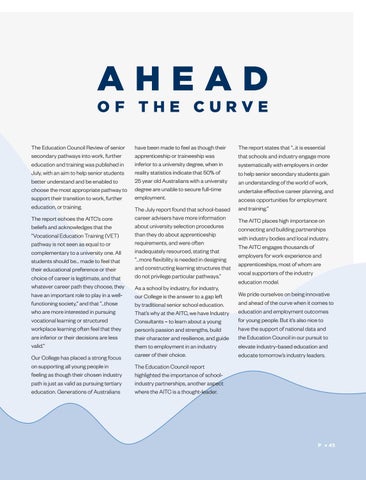AHEAD OF THE CURVE The Education Council Review of senior secondary pathways into work, further education and training was published in July, with an aim to help senior students better understand and be enabled to choose the most appropriate pathway to support their transition to work, further education, or training. The report echoes the AITC’s core beliefs and acknowledges that the “Vocational Education Training (VET) pathway is not seen as equal to or complementary to a university one. All students should be… made to feel that their educational preference or their choice of career is legitimate, and that whatever career path they choose, they have an important role to play in a wellfunctioning society,” and that “...those who are more interested in pursuing vocational learning or structured workplace learning often feel that they are inferior or their decisions are less valid.” Our College has placed a strong focus on supporting all young people in feeling as though their chosen industry path is just as valid as pursuing tertiary education. Generations of Australians
have been made to feel as though their apprenticeship or traineeship was inferior to a university degree, when in reality statistics indicate that 50% of 25 year old Australians with a university degree are unable to secure full-time employment. The July report found that school-based career advisers have more information about university selection procedures than they do about apprenticeship requirements, and were often inadequately resourced, stating that “...more flexibility is needed in designing and constructing learning structures that do not privilege particular pathways.” As a school by industry, for industry, our College is the answer to a gap left by traditional senior school education. That’s why at the AITC, we have Industry Consultants – to learn about a young person’s passion and strengths, build their character and resilience, and guide them to employment in an industry career of their choice.
The report states that “...it is essential that schools and industry engage more systematically with employers in order to help senior secondary students gain an understanding of the world of work, undertake effective career planning, and access opportunities for employment and training.” The AITC places high importance on connecting and building partnerships with industry bodies and local industry. The AITC engages thousands of employers for work experience and apprenticeships, most of whom are vocal supporters of the industry education model. We pride ourselves on being innovative and ahead of the curve when it comes to education and employment outcomes for young people. But it’s also nice to have the support of national data and the Education Council in our pursuit to elevate industry-based education and educate tomorrow’s industry leaders.
The Education Council report highlighted the importance of schoolindustry partnerships, another aspect where the AITC is a thought-leader.
P
45






